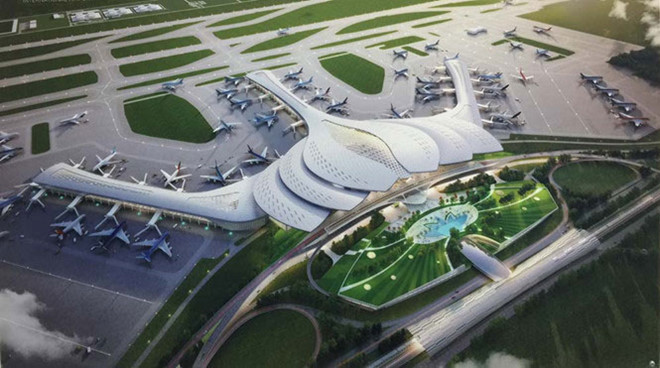Drawing from research into global and domestic free trade zone models, Dong Nai province has developed a proposal for a 16 billion USD free trade zone covering more than 8,500 hectares, closely integrated with Long Thanh International Airport and Phuoc An Port.

On the morning of June 27, the People's Committee of Dong Nai held a conference titled “Free trade zone in Dong Nai - A growth engine in the new era - Taking off with Long Thanh Airport,” which gathered scientists, experts, government officials, businesses, and associations both domestic and international.
The proposed Dong Nai Free Trade Zone spans three major areas, totaling 8,528 hectares, aligned with Long Thanh International Airport and Phuoc An Port.
The project is expected to cost around 16 billion USD, with 5% from public investment, 40% from domestic private capital, and the remaining 55% from foreign direct investment.
According to the Dong Nai Department of Finance, the proposed model is a complex zone, designed to maximize synergies between Long Thanh Airport, Phuoc An Port, and the province’s existing industrial zones.
Development will focus on diverse sectors including manufacturing, logistics, trade, services, and innovation. Each sub-area will feature distinct characteristics and tailored policies.
The Dong Nai Free Trade Zone will connect with the Cai Mep Ha Free Trade Zone in Ho Chi Minh City, forming a mega free trade zone with unified and advanced policies to compete regionally and internationally. It will also align with Ho Chi Minh City’s international financial center strategy.
Key incentives include a five-year corporate income tax exemption for priority industries, five-year personal income tax exemption for foreign experts and workers, and value-added tax exemptions.
Regarding land policies, the People's Committee of Dong Nai will be authorized to allocate or lease land without auction or bidding for projects within the free trade zone, except commercial housing projects.
The zone will offer land leases of up to 70 years, with possible extensions of 10 to 29 years. Land rent will be waived for the first 20 years, after which standard rent will apply.
Vietnamese citizens will also be permitted to purchase duty-free goods within the zone’s trade area, capped at 1,500 USD per person annually, similar to foreign shoppers.
To realize this vision, Dong Nai has petitioned the National Assembly and Government to legislate the establishment of free trade zones across localities, providing the necessary legal foundation for implementation.
The province also seeks a standardized framework for taxation, customs, national security, investment procedures, and land use for such zones.
During the conference, experts, scientists, and business leaders expressed support for Dong Nai’s plan, citing its potential to significantly accelerate economic growth into double digits in the coming era.
They also analyzed the comparative advantages, untapped potential, and strategic development opportunities for Dong Nai with the establishment of a free trade zone.
Vice Chairman of the Dong Nai People’s Committee, Ho Van Ha, stated that the free trade zone would consist of four functional areas: high-tech industrial production, logistics, financial and commercial services, and innovation.
Featuring eight key policy groups and 29 special mechanisms, the project is set to position Dong Nai as a hub for high-tech industries, financial services, logistics, innovation, and international trade.
Dong Nai leaders asked the Department of Finance to incorporate feedback from the conference and finalize the proposal, which is expected to be submitted to the Prime Minister for approval in July.
On this occasion, Dong Nai’s People's Committee announced the establishment of its Socioeconomic Advisory Group and presented flowers to its members.
The advisory group is led by Dr. Truong Minh Huy Vu, Director of the Ho Chi Minh City Institute for Development Studies, and includes economists and research leaders such as Dr. Tran Du Lich, a member of the National Monetary Policy Advisory Council; Dr. Architect Ngo Viet Nam Son, Chairman of NgoViet Architects & Planners; and Professor Dr. Nguyen Minh Ha, Rector of Ho Chi Minh City Open University.
The group’s mission is to provide strategic and policy recommendations for medium- and long-term economic development, and to analyze and forecast economic and social plans and implementation outcomes.
PV